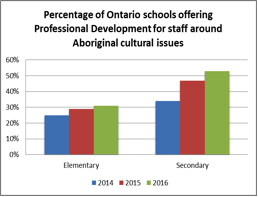Report calls for mandatory curriculum on Indigenous education
New data show improvements in professional development opportunities, but no mandatory curriculum for teacher candidates
For immediate release
TORONTO (May 2, 2016) – A new report from People for Education shows that Ontario’s provincially-funded schools have a substantial distance to go in order to meet the government’s goals for Indigenous education.
The report – Moving toward reconciliation in Ontario’s publicly funded schools – provides new information on three fronts: Ontario’s progress on closing the achievement and knowledge gaps in Indigenous education; its efforts to implement the Calls to Action from Canada’s Truth and Reconciliation Commission; and how a move to “Indigenizing education” would benefit all students in the province’s 5000 schools.
Closing the achievement and knowledge gap between Indigenous and non-Indigenous students
According to the report, more than 80% of Ontario’s Indigenous students attend provincially-funded schools in Ontario school boards. The province set 2016 as a target date to close the achievement gap between Indigenous and non-Indigenous students, and to ensure that all students receive a strong education in Indigenous history, culture and beliefs. The latest available data on achievement shows the gap remains as high as 20 points on EQAO scores and graduation rates. However, some progress is being made in providing consistent Indigenous education to all students.
Among the findings in the report:
- 29% of elementary schools and 49% of secondary schools host Indigenous guest speakers, an increase from 23% and 39% respectively in 2014.
- 13% of elementary schools and 38% of secondary schools consult with Indigenous community members, an increase from 12% and 27% respectively in 2014.
- Schools in small town/rural areas are more likely to have Indigenous education programs and resources.
- 31% of elementary schools and 53% of secondary schools provide professional development for staff on Indigenous education, up from 25% and 34% respectively in 2014.
Implementing the Calls to Action
In its final report released in December 2015, the Truth and Reconciliation Commission (TRC) included specific Calls to Action related to education for reconciliation. Among the recommendations, the TRC called on the provinces to:
- provide mandatory curriculum for all students on residential schools, treaties, and Indigenous peoples’ contributions to Canada;
- include courses in Indigenous culture and history in teacher education programs;
- identify teacher-training needs and provide funding for post-secondary institutions to educate teachers on how to integrate Indigenous knowledge and teachings into their classrooms; and
- Establish senior-level positions in government at the assistant deputy minister level or higher dedicated to Aboriginal content in education.
While the new report shows some progress, the majority of schools still do not offer any Indigenous education activities, and elementary schools have a much lower rate of participation than secondary schools. Furthermore, some survey respondents commented that their schools contained too few First Nation, Métis or Inuit students to warrant a specific focus on Indigenous education, illustrating the need to ensure that educators understand that Indigenous education is important for all students.
Despite having extended the length of the teacher education program to two years, the province has made no move to make an Indigenous education course mandatory for all pre-service teachers. Some universities have taken great strides in this area, but the majority of programs do not require teacher candidates to take any Indigenous-focused courses.
Indigenizing Education: Integrating Indigenous Perspectives
People for Education has also been calling for broader goals and measures of success throughout Ontario’s K-12 education system. The new report includes findings from a recent paper by Dr. Pamela Toulouse of Laurentian University. Her research shows that that by defining success more broadly, and emphasizing a more holistic, interconnected approach to education, both Indigenous and non-Indigenous students will benefit. The concept of living a good life—a balance between the physical, the emotional, the intellectual and the spiritual — is an important way of defining success for Indigenous peoples. Dr. Toulouse offers a holistic model of a quality learning environment, with the student at the centre, interacting with his or her classroom, school community, and global environments.
Moving Forward
People for Education’s report includes several recommendations, including mandatory curriculum for Bachelor of Education programs and the involvement of Indigenous communities at all levels (schools, boards, Ministry) in the development of programs and strategies for students.
Overall, a broader definition of school success aligns with Indigenous beliefs in a holistic approach to education, where education is life-long and focuses on the development of the whole person. In defining school succss more broadly, we can make progress toward truly indigenizing the education system.
For more information please call People for Education: 416-534-0100
